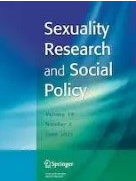Publications by Year: 2021
2021
Abstract
This article discusses the sexual script of Israeli sex industry consumers who self-identify as addicts. It argues that the 'addict sexual script' provides both an explanation for out-of-control sexual behaviour and a channel for expressing the individual client's 'right' to be acknowledged for their suffering in the process of buying sex. Thus, the addict sexual script becomes a coping strategy that, while internalising sex consumption as socially deviant behaviour, also serves as a strategic practice for negotiating and challenging masculine hegemonic ideals. It concludes that the willingness to stigmatise and victimise themselves as disempowered individuals becomes a turning point, which, paradoxically, empowers sex consumers as actors in the framework of consumer capitalism.
Keywords: Addiction, sex industry, consumer culture, hegemonic masculinity, sexual script theory
Introduction This study explores the recent neo-abolitionist legislation of the Israeli sex industry by illustrating the competing claims of various stakeholders: those leading the legal change and those protesting it. The main question is how Israeli sex workers perceive the public debate over governing the Israeli sex industry.
Methods This study combines qualitative methods that include ethnographic observations and interviews. The ethnographic observations were carried out between November 2018 and October 2019 in gatherings, protests, and academic conferences where sex workers were the lead speakers. In addition, 16 in-depth semi-structured interviews were conducted with sex workers across various indoor sectors, and four interviews were conducted with political figures to learn about their efforts to adopt neo-abolitionist legislation.
Results the Israeli legislative proceedings initiated in 2007 deny sex workers a voice and exclude them from the political space and policy debates that have a direct bearing on their working lives and wellbeing. Thus, Israeli sex workers perceive sex work governance as controlling their agency and deepening their stigmatization. In this process, we show how contrasting groups became strange bedfellows in their attempt to protect sex workers by incriminating clients of the sex industry.
Conclusions We conclude that the binary framings of debates about sex work in Israel do not address the actual needs or political desires of sex workers who are ignored and excluded from the discourse about them.
Policy Implications Furthermore, we conclude that the issue at hand is not about permitting sex workers to express their views but rather about the need to listen to their critiques to ensure that policy is built on their knowledge and experience.
Keywords: Sex work policy; Neo-abolitionist legislation; Israeli sex industry; Stigma; Agency



